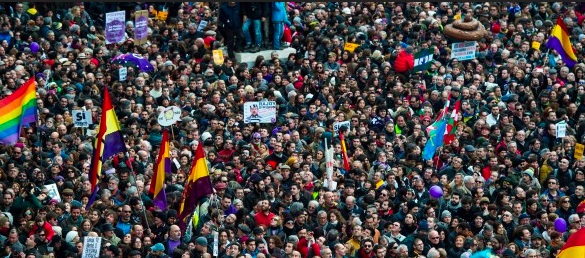Patrick Smith writes: t took a mere six days for the election victory of the anti-austerity Syriza party in Greece to start ricocheting around Europe like a stray bullet in a concrete bunker. And already the fight between northern Europe’s austerians and their populist opponents to the south takes on a political dimension that could transform Europe.
This is an economic confrontation only in part. Debt terms, budget ceilings, privatizations, and the like now emerge as theaters in a larger war. At bottom Europeans are in a fight over (1) the fate of their democracies and (2) the kind of democracy they want—popular or elite, Jeffersonian or Hamiltonian.
it’s a return to politics charged with class-conscious parties who think it’s time to confront political and economic elites rather than “triangulate,” as Bill Clinton famously put it and as every one of Europe’s social-democratic parties have tried to do.
The huge mass of Spaniards may look like a turning point in the months to come. Those interviewed may as well have spoken Greek when they explained to correspondents why they were there.
Spain’s weekend demonstration was the strongest manifestation yet for Podemos, the out-of-nowhere left party that is Syriza’s Spanish equivalent. Podemos (“We Can”) put its crowd count at 300,000; the police’s number was a third of that, but either way this was a very big demo.
The two parties share a common theme, and this is the key to their significance. Both dwell consistently on the question of dignity and humiliation, as in the remark of Angeles Buj, a 61-year-old who spoke to The Times in Puerta del Sol, a politically symbolic square in central Madrid. “It’s time to give some dignity back to the Spanish people,” Buj said.
The truth underlying this too-long-running crisis is this: Entrenched political cliques, often (if not usually) corrupt, and bureaucracies in Brussels and Frankfurt have drastically overplayed their hand in imposing counter-crisis strategies that effectively supersede political rights long beyond question in the industrialized nations. Nobody wins, not even creditors, unless this is corrected..
The pols to watch in the months to come are Pedro Sánchez, who leads Spain’s Socialists, François Hollande, France’s president and a mainstream Socialist, and Matteo Renzi, Italy’s premier, who, for many Italians’ money, professes left and too often governs right.
Podemos, you may recall, burst into the room with an utterly unexpected show of strength in elections to the European parliament last spring; it won 1.25 million votes and took five of Spain’s seats. The momentum since has been astonishing.
The same was said not long ago about Alexis Tsipras, Syriza’s leader, and whatever one may think of his politics he is no dope, has enviable political nous, and has put some accomplished thinkers in key cabinet positions.
From Syriza to Podemos to who knows where next—the spirit of this Mediterranean movement for a political shift leftward in Europe is spreading at ground level. As in Athens, so in Madrid and Rome?

